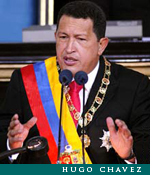| Venezuela
is the 4th largest world supplier of oil and the
3rd largest supplier to the United States. However,
80% of its population live in poverty, with only
a minority who reap the rewards of its main export.
In 1998 the newly elected president of Venezuela
- Hugo Chavez - set about to redress the balance,
attempting to take back control of the privatised
oil industries. The target of this action was
to redistribute the profits of oil export to the
largest section of the population – the
poorer classes, according to the principles of
what is internationally known as Revolución
Bolivariana (Bolivarian Revolution).
In this process of reformation, though, Hugo Chavez
and his government made enemies of the wealthy
elite and were constantly attacked by the media,
owned and controlled by this industrial class.
On April 11, 2002 a military coup took place in
Caracas, led by members of the opposition party
and key Venezuelans working in the oil industry.
They ousted Chavez from office, by means of threatening
to bomb the presidential palace unless he resigned.
The opposition party took full control of the
country and a new president, Pedro Carmona, was
sworn in. Chavez was taken prisoner and his government
replaced by the new authorities.
 Venezuelans,
still supporting Hugo Chavez, arranged a mass
demonstration on the streets of Caracas, calling
for the return of their democratically elected
leader. The protests turned to riots, as the police
was ordered to take a hard line approach, leaving
a number of civilians dead and many others injured. Venezuelans,
still supporting Hugo Chavez, arranged a mass
demonstration on the streets of Caracas, calling
for the return of their democratically elected
leader. The protests turned to riots, as the police
was ordered to take a hard line approach, leaving
a number of civilians dead and many others injured.
Within a period of 48 hours the presidential guard,
who had always been loyal to Chavez, recaptured
the Palace, leaving the failed coup plotters to
flee. Chavez and his government were reinstated.
In December of the same year, the opposition once
again tried to destabilize the country, with the
intent of bringing about the downfall of Chavez.
This time they organized a strike from within
the oil industry. These 9-week stoppages lead
to fuel shortages and practically brought Venezuela
to its knees.
But Chavez managed to survive the attack and is
still to date President of Venezuela - gaining
60% of the electoral vote in the August 2004 national
referendum.
|